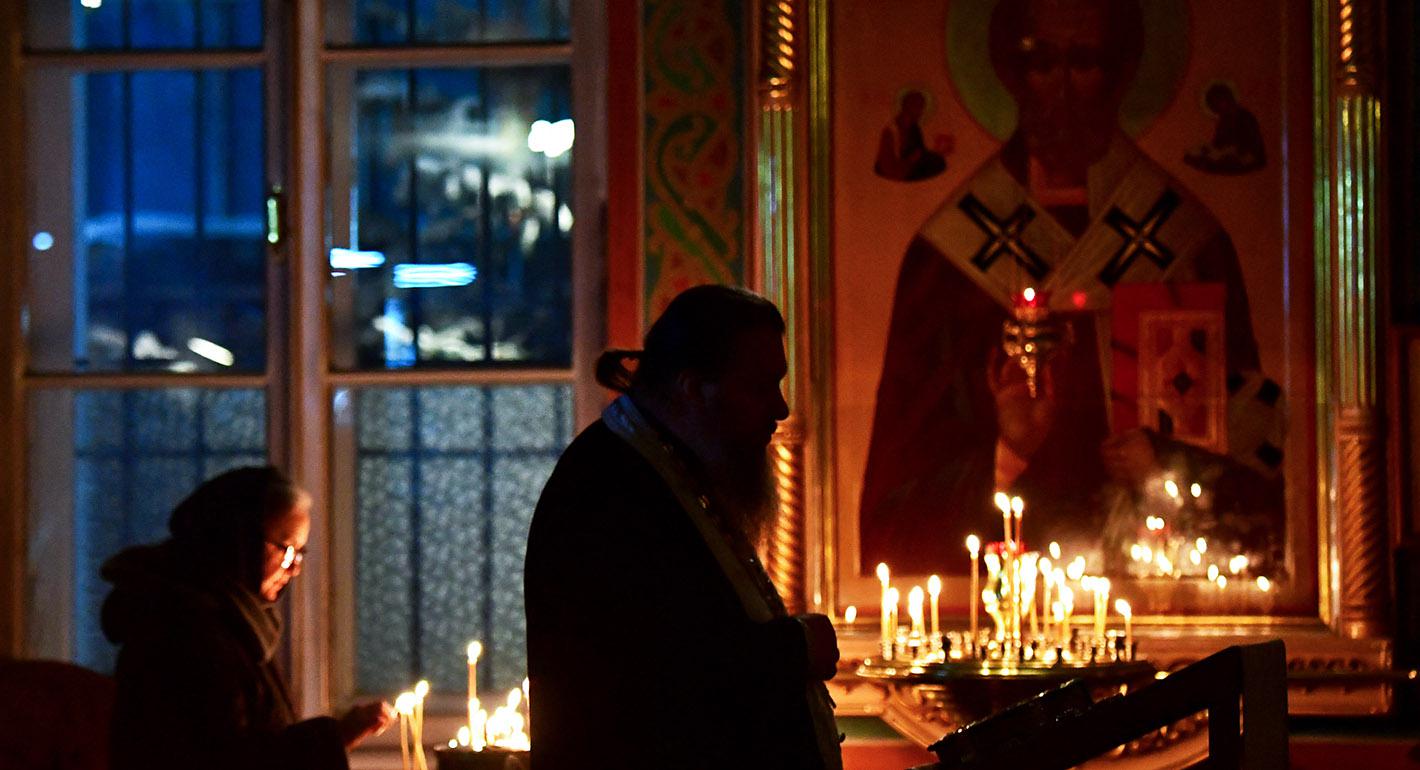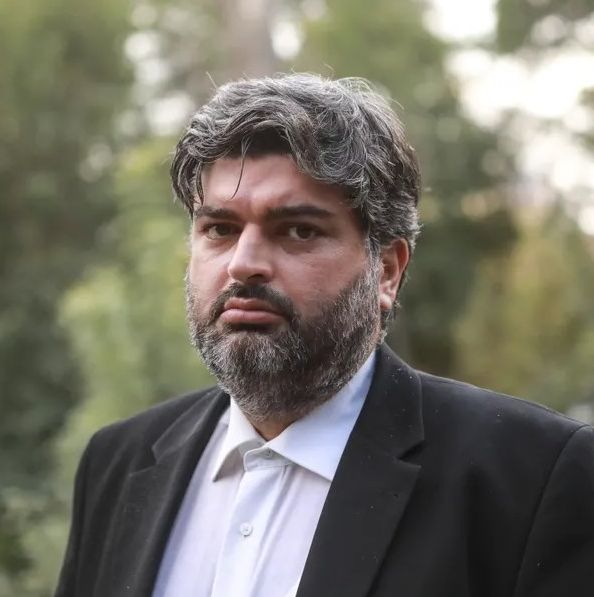Instead of a guaranteed ally, the Kremlin now perceives Armenia as yet another hybrid battlefield where it is fighting the West.
Mikayel Zolyan
{
"authors": [
"Ksenia Luchenko"
],
"type": "commentary",
"blog": "Carnegie Politika",
"centerAffiliationAll": "",
"centers": [
"Carnegie Endowment for International Peace",
"Carnegie Russia Eurasia Center"
],
"collections": [],
"englishNewsletterAll": "",
"nonEnglishNewsletterAll": "",
"primaryCenter": "Carnegie Russia Eurasia Center",
"programAffiliation": "",
"programs": [
"Russia and Eurasia"
],
"projects": [],
"regions": [
"Russia",
"Caucasus"
],
"topics": [
"Religion",
"Political Reform",
"Domestic Politics"
]
}
Source: Getty
After the full-scale invasion of Ukraine, the Russian Orthodox Church publicly embraced the war, sparking a crisis of conscience for priests and parishioners alike.
On February 8, 2024, Patriarch Kirill affirmed a church court order defrocking Alexei Uminsky, a high-profile priest. Officially, Uminsky, who served near Moscow, was punished for disobeying the church hierarchy. Unofficially, he was targeted for refusing to fall into line with the Russian Orthodox Church’s political support for Moscow’s war against Ukraine. His case is just one of many in which Orthodox priests have been targeted for their anti-war beliefs.
Uminsky drew the ire of the church by refusing to recite a prayer for Russia’s victory in Ukraine. Previously, the priest had visited the jailed tycoon Mikhail Khodorkovsky in a professional capacity; spoken out in support of the historian Yury Dmitriev, who was convicted on trumped-up charges of sexual abuse; and urged the authorities to let the late jailed opposition leader Alexei Navalny be seen by doctors. But he had never engaged in political campaigning or taken part in street protests.
Uminsky’s impeccable reputation as a spiritual mentor was not enough to save him. Patriarch Kirill has fully embraced Russia’s cause in Ukraine, and anything less than unequivocal support for the war is perceived by him as a personal affront. He fears that anti-war clerics could discredit him in the eyes of the Kremlin, and jeopardize the Orthodox Church’s close relationship with the state.
According to the online project Christians Against War, twenty-eight priests inside Russia from the Russian Orthodox Church (ROC) have been punished for opposing the war, along with six from ROC parishes in Lithuania, five from Belarus, and one from Kazakhstan. While most have faced only internal disciplinary procedures, some have also been fined by Russian courts.
After the beginning of the conflict in Ukraine in 2014, Kirill gave his blessing for Russian Orthodox priests everywhere to recite a prayer for “an end to internecine warfare.” It was short and made no mention of peace, but nor was there any talk of “victory.”
A few days after Russia’s full-scale invasion of Ukraine in 2022, however, a new version of this prayer, titled “Prayer for the Restoration of Peace,” was circulated through the church. It referred to “Holy Rus” and its enemies, whose plans to “take up arms against Holy Rus” it asked God to “deny and foil.” Then, in September 2022—after a partial mobilization had been announced in Russia—Kirill unveiled yet another version of the same prayer. In its third iteration it appealed for God to “arise … to help Your people and grant us victory through Your power.”
The final version of this war-related prayer has become a litmus test of the Russian Orthodox clergy’s reliability and personal loyalty to Kirill, its presumed author.
The church’s logic is that priests who refuse to say the prayer at the end of each liturgy are violating an oath sworn before their ordination to obey the rules of the church and instructions of the hierarchy. Yet any link between the oath and the pro-war prayer is tenuous at best. Nowhere in the church’s statutory documents is the patriarch empowered to unilaterally regulate liturgical matters. Instead, new liturgical texts are supposed to be proposed by the church’s liturgical commission and approved by the Holy Synod. At no point was this process observed when it came to the prayer relating to the war.
Some priests who were unhappy with the prayer tried to change it, often by replacing the word “victory” with the word “peace.” That might seem like a harmless amendment, but in May 2023, Ioann Koval became the first priest to be defrocked for altering the text.
The situation on the ground does vary. One village priest told this author that his bishop had informally allowed him to read an alternative prayer. But two priests from Siberia and one from the Far East said that the prayer was mandatory, and that their compliance was monitored by senior clerics.
Perhaps counterintuitively, the laity’s role within the Orthodox Church has grown in wartime. This is not because of a return to communal principles, but because they have gained leverage over the clergy through the threat of denunciations.
Anti-war priests increasingly fear their own parishioners. They can only refuse to say the prayer relating to the war in the presence of trusted members of their congregation, let alone recite a prayer for peace. Nearly all the priests who have been disciplined or defrocked by the church were initially denounced by their parishioners.
In March 2022, priest Ioann Burdin, who served in the Kostroma region outside Moscow, told a congregation of just ten people that he was praying for peace in Ukraine. Two hours later, the police arrived at the church, and he was charged with “discrediting” the armed forces. Burdin continued to criticize the war on social media and refused to recite the patriarch’s prayer. Eventually, he was barred from leading services.
Ilya Gavryshkiv was another priest denounced by a parishioner. Gavryshkiv’s bishop personally confronted him during a service, forcing him to repent before his congregation, including Oleg Tsarev, his denouncer. Tsarev captured it all on film.
Facing church discipline might not seem such a terrible fate when compared to a prison sentence. Yet it can be a severe punishment for priests who have no alternative career, often have large families that they need to support, and are plugged into a social network inextricable from the church. Being defrocked often causes a crisis of identity. Ex-priests can also be conscripted, since they are no longer covered by a church agreement with the Defense Ministry.
Then there is the threat of criminal charges. Even before the war, many of the 180 priests who signed an open letter in support of opposition protesters in 2019 came to the attention of the security services, which made inquiries and pulled their personnel files. Some were warned that all public activity, including on social media, was being monitored.
We know of at least one priest who was targeted by the security services for signing an open letter against the war in 2022: Gleb Krivoshein, who was forced to pay a small fine.
For those priests seeking to leave Russia, joining another Orthodox church is no easy task. Doing so requires a document issued by the patriarch with the approval of the Holy Synod, which is valid for just three months. Priests who fall out of favor over their opposition to the war cannot count on the church hierarchy to help them out. This means that priests who fled to Georgia or Serbia after the invasion cannot simply join the local Orthodox churches, which have close ties to Moscow.
The Patriarchate of Constantinople, however, with which the Russian Orthodox Church has been at odds since the former greenlit the creation of the Orthodox Church of Ukraine in 2019, argues that it has the right to reinstate wrongly defrocked priests. The relationship between Moscow and Constantinople has only deteriorated since the full-scale invasion, with the latter’s Patriarch Bartholomew taking the same view of the war as the West.
As a result, a few Russian priests have transferred to the Patriarchate of Constantinople. This is easier to do as a collective: in March 2022, for example, a Russian Orthodox parish in Amsterdam broke away from Moscow and was accepted by Constantinople. Still, such cases are few and far between.
Nor is Constantinople in any position to help clerics fleeing Russia to relocate to the European Union or the United States. Even the visa regulations of the Patriarchate of Constantinople’s home country, Turkey, do not make it easy for Russians to settle there permanently. Russian clerics who move to countries such as Armenia, Georgia, Serbia, and Kazakhstan need not worry about visas, but they cannot serve as priests and must find secular employment (there are known cases of priests working as taxi drivers).
It is fair to conclude that there are plenty of opponents of the war within the Russian Orthodox Church, among both the clergy and the laity. At the very least, the ratio of those who are pro-war and those who are anti-war is the same as society at large. Some of those opponents are liberals, while others are conservatives. All share a desire for church life to return to normal, and be protected from politicization.
Until President Vladimir Putin and Patriarch Kirill leave the scene, the anti-war faction within the church will likely be limited to small acts of resistance. But religion can also influence public attitudes toward the war: after all, Christianity is part of a person’s identity, a basis for empathy, and a moral compass for decisionmaking. Russian Orthodoxy as a social and cultural phenomenon is not going anywhere.
For the moment, however, there is no meaningful discussion of religion in Russian opposition circles, and Russian priests abroad have not banded together, either for short-term lobbying or to advance a longer-term vision.
Russian priests and parishioners in exile face a choice. They can do nothing, and gradually assimilate. They can remain chained to traditions of prostration before power and money, and carry out the role of ideological servant to one or more opposition groups. Or they can become part of a broader anti-war, pro-democracy movement and ensure religious Russians get a say in their country’s future.
Carnegie does not take institutional positions on public policy issues; the views represented herein are those of the author(s) and do not necessarily reflect the views of Carnegie, its staff, or its trustees.
Instead of a guaranteed ally, the Kremlin now perceives Armenia as yet another hybrid battlefield where it is fighting the West.

Mikayel Zolyan
The supposed threats from China and Russia pose far less of a danger to both Greenland and the Arctic than the prospect of an unscrupulous takeover of the island.

Andrei Dagaev
Western negotiators often believe territory is just a bargaining chip when it comes to peace in Ukraine, but Putin is obsessed with empire-building.

Andrey Pertsev
Unexpectedly, Trump’s America appears to have replaced Putin’s Russia’s as the world’s biggest disruptor.

Alexander Baunov
The Kremlin will only be prepared to negotiate strategic arms limitations if it is confident it can secure significant concessions from the United States. Otherwise, meaningful dialogue is unlikely, and the international system of strategic stability will continue to teeter on the brink of total collapse.

Maxim Starchak